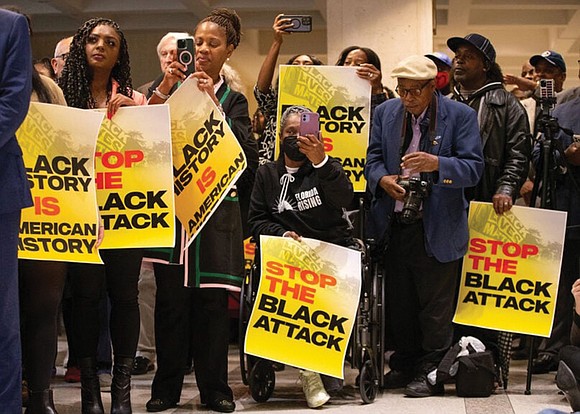What is Black History Month in a white Christian nation?
Andre Whitehead | 2/16/2023, 6 p.m.

Just in time for Black History Month, the Public Religion Research Institute and the Brookings Institution have released a fascinating new survey about Christian nationalism that points to the ways that stories about race in American history get told and why these stories matter.
The PRRI/Brookings Christian nationalism survey adds to a host of research that demonstrates the historical repercussions of this powerful cultural framework. It shows that Christian nationalism can serve to rewrite history so that racial injustice and those responsible for it are rendered almost invisible.
A few of the survey’s findings:
• Two-thirds of white Americans who strongly embrace Christian nationalism disagree that white supremacy is still a major problem — compared with one-third of all Americans.
• Just over 80 percent of white Americans who strongly embrace Christian nationalism disagree that generations of slavery and discrimination make for an uneven playing field for Black Americans — compared with 45 percent of all Americans.
• 85 percent of white Americans who strongly embrace Christian nationalism believe discrimination against white Americans is as big of a problem as discrimination against Black Americans and other minorities — compared with 41 percent of all Americans.
• Just over 70 percent of white Americans who strongly embrace Christian nationalism disagree that a Black person is more likely to receive the death penalty for the same crime (an empirical reality in our current justice system) — compared with 36 percent of all Americans.
White Americans, in sum, who believe this country was founded as a Christian nation and desire to see a particular expression of Christianity privileged in the public square imagine a very different past and present when it comes to the experiences of Black Americans. Nonwhite Americans, interestingly, shared some notions of Christian nationalism, the survey found. But those Black Americans who strongly embrace Christian nationalism score anywhere from 23 to 37 percent lower than their white counterparts, depending on the question.
The gap is most obvious when examining historical explanations for economic inequality experienced by BlackAmericans today. Only 46 percent of non-white Americans who strongly embrace Christian nationalism disagreed that generations of slavery and discrimination still affect Black Americans’ chances. More than 80 percent of white Americans who strongly embrace Christian nationalism disagreed.
These findings underscore why many social scientists add “white” when talking about “Christian nationalism.” The desire to see a particular expression of Christianity privileged in the public sphere and preserved by the government operates differently for white and Black Americans.
Another reason to add “white” before Christian nationalism is that it was white Christian denominations and religious institutions that created the narrative of a “Christian nation” and sustained it throughout American history. Recent historical work demonstrates that white Christians “baptized” slavery, Jim Crow and later iterations of racially inequality as God’s will for this Christian nation. Their theologies and religious explanations framed social injustice as an unfortunate reality of a fallen world. White America and white Christianity were thereby absolved of any guilt or responsibility.
Today, those who push back against teaching this history argue that we should all be judged by our character, not the color of our skin. But surveys like this one show that white Christian nationalism is not about skin color or even the race we identify with. Rather, it refers to “whiteness” — the values, habits, beliefs, behaviors and attitudes that result in the organization of society in such a way that white Americans, as a group, tend to have greater access to power, privilege, wealth and other benefits bestowed by various social institutions.
The writer is an associate professor of sociology at the Center for the Study of Religion and American Culture at IUPUI.





